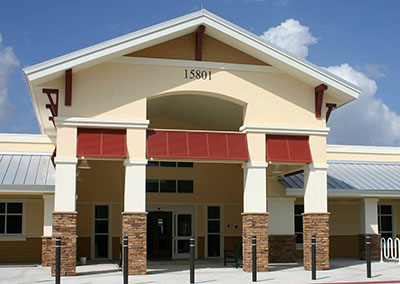The Acreage Incorporation Committee met at the Acreage branch library on Monday, April 4 for the first time since the Palm Beach County Legislative Delegation voted down the committee’s first attempt to get an incorporation bill through the state legislature late last year.
About 10 residents attended, in addition to committee members Bob Morgan, Elizabeth Accomando and Lou Colantuoni, and Indian Trail Improvement District Supervisor Betty Argue.
Colantuoni said the purpose of the meeting was to prepare for next year’s attempt to get the bill through the legislature, explain why they were working for incorporation and to get feedback from residents.
“We’re trying to petition the State of Florida to allow us to have a referendum vote to become incorporated,” Colantuoni said, explaining that a successful referendum outcome would give Acreage residents the same powers as nearby municipalities. “I call it trying to fight a fire with fire. The process has to go forward this fall, and once approved, the next fall we would have to vote.”
Argue noted that at the delegation meeting last December, local members from the Florida House of Representatives voted to approve the bill, but it failed to get a majority of votes from members of the Florida Senate.
“The rules for a local bill to be filed, you have to have a majority from the House of Representatives and a majority of the senators present in order for it to be approved to move forward,” she said. “In our case, what happened was one senator, Bobby Powell, who has a small portion of the area in his district, was not supporting it. Two of the other senators also went his way.”
State Sen. Gail Harrell supported the bill.
“This coming year, the election is kind of important, but the redistricting does change things a bit, because our whole area will be in what will likely be Gail’s future area, if she decides to run in the same district, which I’m assuming she is,” Argue said.
Colantuoni said a feasibility study required by the state to show that the district could survive financially was reviewed favorably.
“If anything, there was some criticism that we really underestimated our potential income, which is a good thing, because it’s going to be reworked with more up-to-date figures, and it will be an even better picture,” he said. “We’re all in agreement that the new municipality would be sustainable and feasible from a financial point of view.”
Colantuoni said there has been a great deal of discussion about taxes for a municipality.
“It also has to do with when you bought,” he said. “If you bought in the last six years, you’ll probably see a little raise because the home values are higher, and if you bought a long time ago, like I did, or 10 years ago, it may be a little less.”
Argue said the feasibility study states that the municipality would need an ad valorem tax of 3 mills to cover costs.
“The proposal in the feasibility study relies on the Indian Trail Improvement District to remain independent, because we really cannot make it dependent. We have other areas that have bonds that are in another city,” she said. “That was the preference of the local delegates, so we changed it. Once those bonds are paid off in 2031, at that time, we could have a referendum where we would either dissolve the district or have a referendum to make it dependent on the municipality.”
Residents in an incorporated municipality would pay a 3-mill property tax, and ITID would turn over all its assets, except for drainage, and non-ad valorem assessments that ITID charges would be reduced.
“We figure that it will be reduced to about a quarter of the budget that Indian Trail currently spends,” Argue said. “If you take 3 mills on what your taxable value is, and then deduct what the reduction is of your non-ad valorem assessment would be, in some cases you would see a reduction if you’ve been here for a long time, depending on how much property you have.”
However, non-homesteaded residences assessed at $850,000 bought less than six years ago would see a $1,500 increase in their taxes.
Argue added that there are a lot of things that a number cannot be put on. For example, ITID is a special district, which can only levy non-ad valorem assessments.
“You pay 100 percent for absolutely everything that Indian Trail provides for you, it’s roads and parks and drainage,” she said. “We don’t get funding from anyone else. Whatever that cost of infrastructure, of improvements, of capital improvements, the impacts from outsiders who are not paying taxes, you’re paying for it.”
Argue added that when ITID was created years ago, it did not have a municipality that was dropped in the middle of it, or a municipality infringing on the northern boundary.
“Now, we’re faced with a city being built in the center of us, wanting to connect to our roads and wanting to benefit from the use of our roads, and not have to pay for it,” she said. “The financial impact of that on our roads is going to be in excess of $20 million. We’ve never had to deal with what we’re faced today with Westlake and the Seminole Improvement District.”
She said that ITID has to rely solely on Palm Beach County for law enforcement, traffic control and speed limits, including stop signs and intersection lights.
“The county has refused any requests to lower speed limits on our roads, specifically in locations where we have a high number of crashes,” Argue said. “Because of the onslaught, I call it the traffic tsunami, that’s coming… the people are going to really get hammered with traffic if we don’t do something. We have to do something to help ourselves.”








